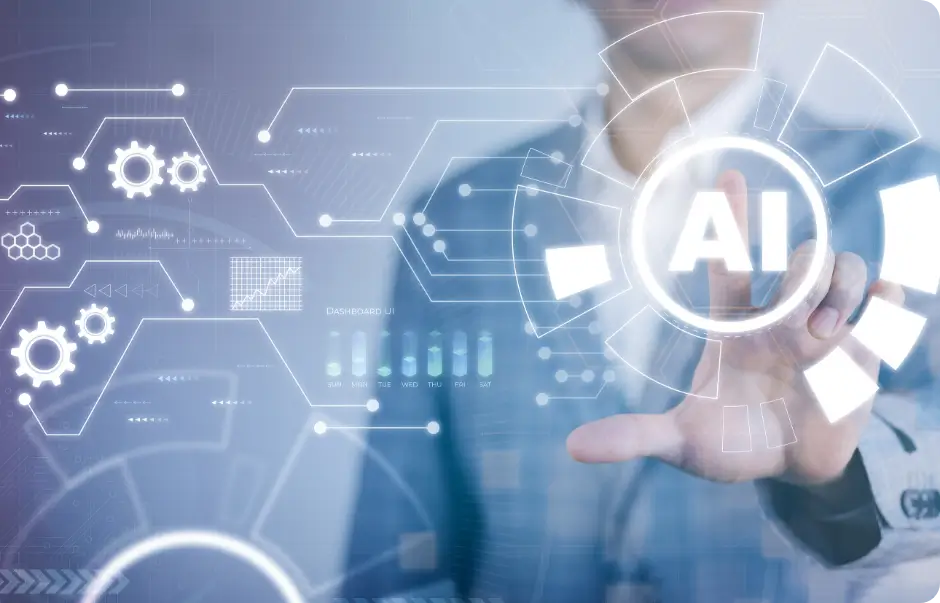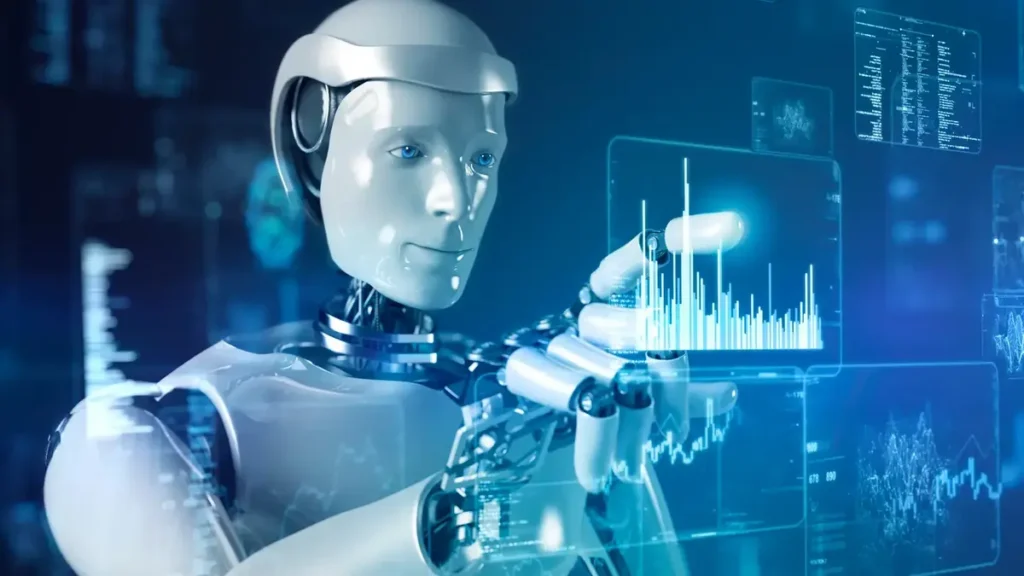How Artificial Intelligence Is Transforming Business

November 9, 2023
AI business transformation is profoundly reshaping the sphere of Human Resources (HR) in the ever-evolving technological world. AI heightens the importance of strategic human capital management and strengthens frameworks for effective talent acquisition, retention, and progression. Utilizing predictive analytics, offers businesses a pathway to unlock their vast potential, securing a future where customer loyalty and steady revenue thrive together seamlessly.

Artificial Intelligence (AI) has grown quickly from its early days. Once just an idea in old stories, AI is now everywhere in our lives. We see it when our phones suggest words as we type or when we get movie ideas online. Now, more and more businesses use AI too. They find it helps them work better and serve customers in new ways. Because of this, AI business transformation works in big ways.
What is artificial intelligence?
To comprehend how AI is changing business and grasp the profound impact of AI business transformation, let’s first define Artificial Intelligence. Simply put, AI involves enabling machines to mimic human intelligence and capacities—think, learn, and solve problems—through carefully constructed algorithms. These algorithms are engineered to make decisions, often leveraging data insights to solve issues or add value in a way that imitates human thinking.
Positioned as a pivotal technology shaping the future of work, in the business and Human Resources field, AI surmounts mere automation, elevating decision-making and refining processes, especially in talent acquisition. It intertwines with contemporary business practices, offering advancements like automated customer service and predictive analytics. The adoption of AI propels businesses into a future where strategies are data-driven and decision-making harmonizes algorithmic input with human insight, sculpting a landscape where technological and human elements seamlessly coalesce.

How artificial intelligence is transforming business
AI’s role in automation is significant, especially for growing businesses, where tasks can be streamlined and handled more efficiently with AI technologies and also aids in identifying trends and making predictive analyses, contributing to more strategic planning and actions.
Increasing automation
As we hinge into the digital epoch, the role of automation, particularly within the framework of AI business transformation, has assumed a pivotal role in bolstering operational efficacy across sectors. The entrenchment of AI tools in handling repetitive tasks—such as managing customer inquiries via chatbots or organizing schedules through intelligent calendar management platforms—liberates human workers, allowing them to channel their expertise towards more crucial, strategic roles. Notably, AI doesn’t merely automate; it perpetually refines its processes through machine learning algorithms, enhancing its ability to execute tasks with elevating precision over time.
Changing the workforce
Navigating through the corridors of modern businesses, it’s palpable that AI doesn’t simply slot into existing structures but significantly disrupts and redefines them, forging a dual-edged sword of concerns and opportunities. While the automation of repetitive tasks looms as a threat to certain job roles, the dawn of AI unfurls a new realm of positions, creating spaces for individuals to manage, maintain, and innovate atop these technological platforms. The AI business transformation is, therefore, not a replacement but a reconfiguration of the workforce, fortifying human capabilities and unleashing fresh avenues for innovation and development.
Assisting in making Informed decision
Transitioning from a data-driven to an AI-driven framework signifies more than a technological shift; it heralds a novel era of swift, accurate, and comprehensive data analysis. AI not only trawls through colossal datasets but also discerns patterns, forecasts trends, and prescribes actionable with a meticulousness and speed unattainable by human counterparts. This transmutation in decision-making not only saves time and resources but also augments strategic development, imbuing it with a depth and foresight that is inherently tied to comprehensive data interpretation.

AI and risk management
AI business transformation nudges enterprises towards a secure, robust operational framework by not only contemplating but actively mitigating risks. By continuously analyzing data patterns, AI systems can foresee potential threats, enforce security protocols, and even recommend necessary upgrades, ensuring that businesses remain safeguarded against both extant and emerging threats. This preemptive approach towards risk management goes beyond mere preservation, bolstering a company’s resilience and adaptive capabilities in a fluctuating digital landscape.
Personalizing customer experience
In a time when customer loyalty is intricately linked with personalized experiences, the question of how AI affects business becomes paramount, particularly in forging connections between customer data and tailored engagement strategies. The meticulous analysis of purchasing histories, preferences, and interactions by AI algorithms not only shapes individualized customer experiences but also amplifies Customer Relationship Management (CRM) platforms, transforming them into predictive, self-updating systems. The cascading effects of such AI-driven personalization extend into marketing strategies, harmonizing them effectively with consumer desires and expectations, thereby showcasing the subtle yet profound impact of AI in shaping business consumer interactions and strategies.
Recruitment and talent sourcing
Sculpting a competent, vibrant workforce is pivotal for any organization, and AI significantly rejuvenates this facet, especially within the precincts of recruitment and talent sourcing. AI chatbots, beyond merely automating interactions, innovate the initial phases of recruitment by streamlining job postings and efficiently scanning resumes to identify fitting candidates. AI-powered recruitment solutions don’t simply alleviate the administrative burden but significantly amplify precision and responsiveness in candidate selection, embedding a layer of unparalleled efficacy and strategic alignment in talent acquisition amidst the AI business transformation.
Artificial Intelligence has transitioned from a potential future to a dominating presence in today’s business reality, spearheading a new epoch in AI business transformation. AI does not merely automate but revolutionizes various business domains like workforce management, operational efficiency, and decision-making, bringing both challenges and innovative opportunities. Amidst concerns like job displacement, it also carves pathways for novel roles and enhanced human functionalities.
The AI business transformation unfolds not just as a technological shift but as a catalyst, impelling positive alterations, dictating that businesses not merely adapt but innovatively evolve alongside. Navigating further into the digital era, the amalgamation of technological expertise with strategic implementation becomes more than advantageous—it becomes essential. Especially with the inclusion of HR consulting services, businesses ensure that the impact of AI in business is comprehensive, affecting not only processes but also permeating the overarching business ethos and market presence.



